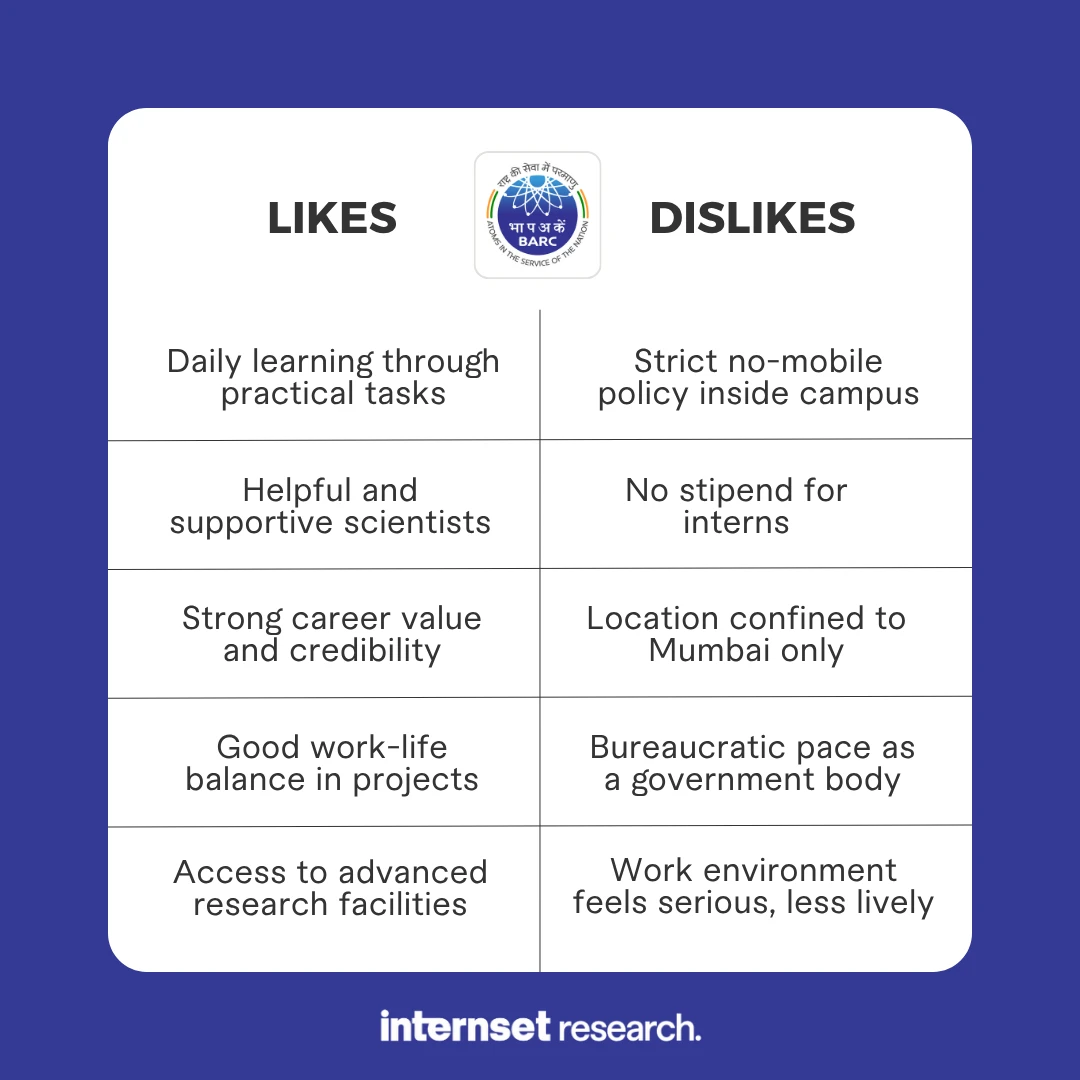


1 Popular internship programs at BARC
1.1 Nuclear Science Internship
The Nuclear Science program offers interns in-depth exposure to the theoretical and experimental foundations of atomic energy. The program begins with guided modules on radiation physics, nuclear fuel cycles, and reactor fundamentals. Trainees attend seminars delivered by senior researchers, where they learn about India’s nuclear energy initiatives and research methodologies. It also includes demonstrations of radiation detection systems and curated study sessions that emphasize the translation of nuclear theory into real-world applications.
1.2 Engineering Design & Reactor Internship
This program provides an extensive curriculum on nuclear reactor engineering. It offers detailed workshops on thermal hydraulics, mechanical component design, and reactor safety systems. Participants are introduced to BARC’s engineering facilities and receive orientation in computational modeling tools that simulate reactor conditions. The program is organized to help students understand how engineering principles are applied to large-scale nuclear infrastructure, with emphasis on safety, reliability, and innovation.
1.3 Project Trainee Internship
The Project Trainee program is one of the most recognized internship formats at BARC. It offers an immersive environment where students are assigned a specific research or engineering project for a defined period, typically between two and six months. The program begins with orientation sessions, followed by independent work under close mentorship. Trainees are given access to laboratories, computational facilities, or field sites depending on the project.
1.4 Health Physics & Radiation Safety Internship
The Health Physics program trains students in radiological protection and safety management. Participants are given access to BARC’s safety laboratories and receive modules on dosimetry, biological effects of radiation, and occupational exposure standards. The program also emphasizes hands-on learning in safety protocols, covering both workplace and environmental monitoring. Students learn through guided field visits, demonstrations of radiation survey equipment, and case-study sessions that focus on international safety guidelines.
1.5 Material Science & Metallurgy Internship
This program introduces participants to the specialized field of nuclear materials. It offers comprehensive learning modules on metallurgy, structural material behavior under radiation, and advanced corrosion studies. Students are taken through demonstrations of material characterization tools such as X-ray diffraction and electron microscopy. The program also provides exposure to alloy development processes and nanomaterials research relevant to reactor technology. By design, this internship aligns participants with India’s ongoing innovations in nuclear-grade materials, giving them exposure to high-end research environments.
1.6 Computational & Data Analysis Internship
The Computational program focuses on preparing students for the growing role of data and modeling in nuclear research. It offers organized workshops on numerical methods, scientific programming, and high-performance computing. Participants are introduced to BARC’s computational infrastructure, including supercomputing facilities, and guided on how such systems accelerate nuclear research. Learning also covers visualization of large-scale data and the use of simulations in predicting reactor performance.
1.7 Electronics & Instrumentation Internship
1.8 Environmental & Chemical Sciences Internship
This program trains participants in the chemical sciences and environmental monitoring aspects of nuclear facilities. It includes detailed sessions on water treatment chemistry, effluent analysis, and nuclear waste management protocols. Interns are guided through demonstrations of environmental monitoring equipment and introduced to lab practices that ensure compliance with national and international standards. The program also provides modules on sustainability practices and the chemical principles behind nuclear fuel reprocessing.
1.9 Applied Research Internship (Specialized Projects)
The Applied Research program is designed as a tailored training pathway for students aligned with niche research domains. Depending on academic background, participants may be placed in specialized modules such as computational biology, medical applications of radiation, nanotechnology, or biotechnology. Each stream provides curated mentorship, access to dedicated laboratory setups, and academic guidance for dissertation-level research. The program emphasizes independent exploration within a guided framework, making it particularly valuable for postgraduate and doctoral students.
1.10 Computer Science & IT Internship
This program is focused on training students in software development and computational systems relevant to scientific research. Extensive modules cover database design, full-stack development, and optimization of research software. Participants are introduced to BARC’s high-performance computing facilities and trained in workflows that manage large-scale scientific data. The program also highlights the role of information systems in research management, equipping students with a unique blend of IT knowledge and applied scientific exposure.
1.11 Robotics Internship
The Robotics program at BARC offers participants an opportunity to explore automation, remote handling systems, and robotic applications designed for high-radiation and hazardous environments. The internship provides learning modules on robotic kinematics, control systems, and sensor integration, with demonstrations of how robotics is applied in nuclear research and reactor maintenance. Interns are guided through labs where robotic arms, manipulators, and mobile robots are developed for tasks such as waste handling, inspection, and remote surveillance.
1.12 Advanced Material Science Internship
This program offers intensive training for students placed in BARC’s Material Science Division. It includes rotations through different material testing labs, exposure to nanomaterials synthesis, and demonstrations of cutting-edge imaging technologies. Students gain deep insight into the lifecycle of materials in nuclear environments, from design to deployment. The program also aligns with India’s global collaborations in material science, giving interns a holistic view of how nuclear materials research is advancing worldwide.
2 Popular roles for interns at BARC
1. Research Intern: Works on ongoing research projects, assisting in experiments, data collection, and literature reviews. Often tasked with maintaining lab notebooks and preparing technical notes for supervisors.
2. Engineering Intern: Contributes to design tasks, CAD drawings, and prototype evaluations. Supports testing of mechanical and thermal systems under different conditions.
3. Health Physics Intern: Assists in radiation surveys, manages dosimeter readings, and helps maintain safety records. Prepares daily logs of radiological conditions across labs or facilities.
4. Computational Intern: Codes numerical models, runs simulations, and analyzes large datasets. Writes scripts or programs that help automate calculations or visualize scientific outputs.
5. Material Science Intern: Prepares and analyzes samples, conducts corrosion or strength tests, and supports metallurgical evaluations. Works with lab equipment like spectrometers and microscopes.
6. Electronics Intern: Calibrates sensors, assists in circuit testing, and works on automation systems. Helps maintain or troubleshoot instrumentation in labs.
7. Environmental Intern: Collects and analyzes soil, water, or air samples. Prepares chemical reports and contributes to monitoring effluent discharge and safety compliance.
8. Project Intern (Custom): Works independently on a specific research problem, carrying out experiments or simulations relevant to their academic background.
9. Project Trainee Intern: Takes responsibility for a defined project within a division, often balancing independent work with periodic mentor reviews. Expected to submit a final report or dissertation.
10. Computer Science Intern: Develops or improves software tools, designs databases, or supports IT systems used in research environments. Works on backend coding, interfaces, or data security.
11. Supercomputing Intern: Runs test cases on BARC’s HPC systems, supports optimization of research codes, and contributes to performance benchmarking. May assist in documentation of system workflows.
Related articles:
1. What do BARC interns work on in Fuel Handling Control Section?
2. What do BARC interns in the Material Science Division work on?
3. How competitive is the selection process for ONGC internships?